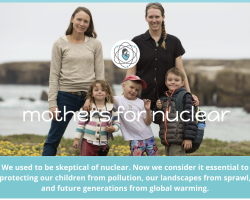Category of Content
Siting Experience Documents Only
Publication Date
Subject Matter
Keywords
A Salt Repository Concept for CSNF in 21-PWR Size Canisters
A Salt Repository Concept for CSNF in 21-PWR Size Canisters
Appendix L – Atlas Railcar Cask and Cradle Dynamic Modeling Inputs (CALC-3015934)
Appendix L – Atlas Railcar Cask and Cradle Dynamic Modeling Inputs (CALC-3015934)
Standardized Transportation, Aging and Disposal Canister Feasibility Study
Standardized Transportation, Aging and Disposal Canister Feasibility Study
Standardized Transportation, Aging, and Disposal Canister Feasibility Study
Standardized Transportation, Aging, and Disposal Canister Feasibility Study
Used Fuel Management System Architecture Evaluation, Fiscal Year 2012
Used Fuel Management System Architecture Evaluation, Fiscal Year 2012
Materials for Consideration in Standardized Canister Design Activities??
Materials for Consideration in Standardized Canister Design Activities??
Next-Generation Waste Management System Analysis Model (NGSAM) Training Manual
Next-Generation Waste Management System Analysis Model (NGSAM) Training Manual
A Historical Review of the Safe Transport of Spent Nuclear Fue?l
A Historical Review of the Safe Transport of Spent Nuclear Fue?l
Insight from Public Surveys Related to Siting of Nuclear Waste Facilities: An Overview of Findings from a 2015 Nationwide Survey of US Residents
Insight from Public Surveys Related to Siting of Nuclear Waste Facilities: An Overview of Findings from a 2015 Nationwide Survey of US Residents
Design and Prototype Fabrication of Railcars for Transport of High-Level Radioactive Material; Phase 3 - Prototype Fabrication and Delivery
Design and Prototype Fabrication of Railcars for Transport of High-Level Radioactive Material; Phase 3 - Prototype Fabrication and Delivery
Appendix A – Design Changes Due to the Addition of the HI-STAR 190 Casks
Appendix A – Design Changes Due to the Addition of the HI-STAR 190 Casks
M3SF-21PN020401053- COBRA-SFS Version 6.1 User Guide- A Thermal Hydraulic Analysis Code for Spent Fuel Storage and Transpor
M3SF-21PN020401053- COBRA-SFS Version 6.1 User Guide- A Thermal Hydraulic Analysis Code for Spent Fuel Storage and Transpor
A Salt Repository Concept for CSNF in 21-PWR Size Canisters, Rev 2
A Salt Repository Concept for CSNF in 21-PWR Size Canisters, Rev 2
M4SF-19ID020303045- Atlas Railcar Phase 3 Final Report
M4SF-19ID020303045- Atlas Railcar Phase 3 Final Report
Performance Specification for Standardized Transportation, Aging, and Disposal Canister Systems
Performance Specification for Standardized Transportation, Aging, and Disposal Canister Systems
Appendix B – Revised Railcar-to-Cradle Attachment Interface
Appendix B – Revised Railcar-to-Cradle Attachment Interface
Appendix D – Revised Conceptual Cradle Design Family 4
Appendix D – Revised Conceptual Cradle Design Family 4
Standardized Transportation, Aging, and Disposal Canister Feasibility Study
Standardized Transportation, Aging, and Disposal Canister Feasibility Study
Mothers for Nuclear Flyer
Mothers for Nuclear Flyer
Mothers for Nuclear Informational Flyer
Report of the World Commission on Environment and Development: Our Common Future
Report of the World Commission on Environment and Development: Our Common Future
Our Common Future, Chairman's Foreword
"A global agenda for change" - this was what the World Commission on Environment and Development was asked to formulate. It was an urgent call by the General Assembly of the United Nations:
Guidance for Creating a Community Benefits Plan for Regional Direct Air Capture Hubs
Guidance for Creating a Community Benefits Plan for Regional Direct Air Capture Hubs
This document is intended to provide supplemental information to assist applicants developing a Community Benefits Plan (CBP) for the Regional Direct Air Capture Hubs. As shown in the graphic to the right, Community Benefits Plans are based on a set of four core interdependent policy priorities: engaging communities and labor; investing in America's workforce; advancing diversity, equity, inclusion, and accessibility; and implementing Justice40.
Socio-technical multi-criteria evaluation of long-term spent nuclear fuel management strategies: A framework and method
Socio-technical multi-criteria evaluation of long-term spent nuclear fuel management strategies: A framework and method
In the absence of a federal geologic repository or consolidated, interim storage in the United States, commercial spent fuel will remain stranded at some 75 sites across the country. Currently, these include 18 “orphaned sites” where spent fuel has been left at decommissioned reactor sites.
Representing future generations in public participation procedures regarding the siting of a nuclear waste repository
Representing future generations in public participation procedures regarding the siting of a nuclear waste repository
State decisions regarding a repository for high-level radioactive waste have an extraordinary intergenerational significance. The academic legal discussion has increasingly strengthened the status of future generations in constitutional law. In its recent decision on the German Climate Protection Act, the Federal Constitutional Court equally emphasised that state actors have an obligation to protect future generations. Fundamental rights of future generations thus have an anticipated effect in the present.
What Do People Say When They Become “Future People”?―Positioning Imaginary Future Generations (IFGs) in General Rules for Good Decision-Making
What Do People Say When They Become “Future People”?―Positioning Imaginary Future Generations (IFGs) in General Rules for Good Decision-Making
In public decisions with long-term implications, decisions of the present generation will affect long-term welfare, including future generations. However, only the present generation is able to participate in such decision-making processes. In this study, we invited “Imaginary Future Generations” (IFGs), as participants in a discussion who take on the role of members of future generations to argue on behalf of their future interests to engage in present-day deliberations among residents of a Japanese town.

